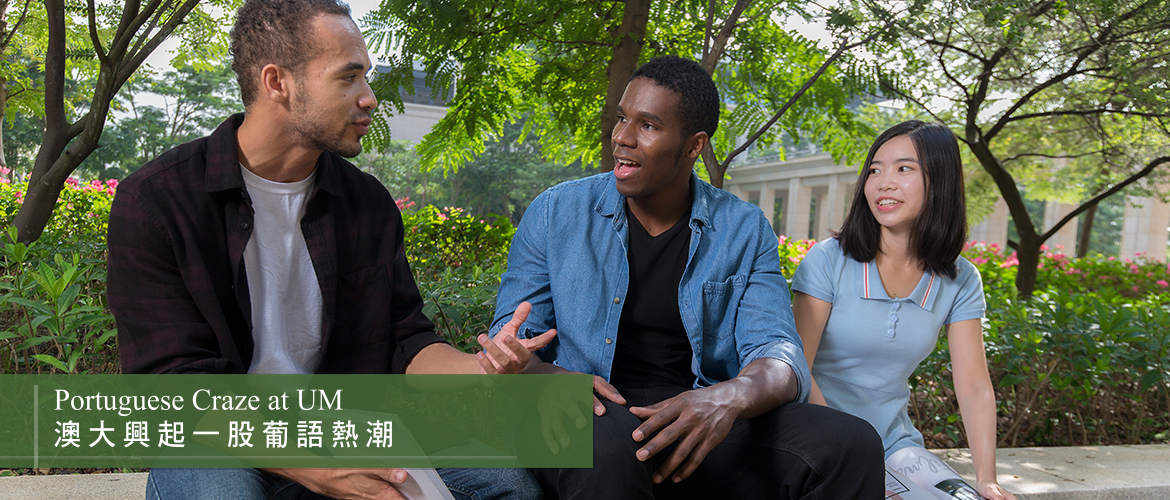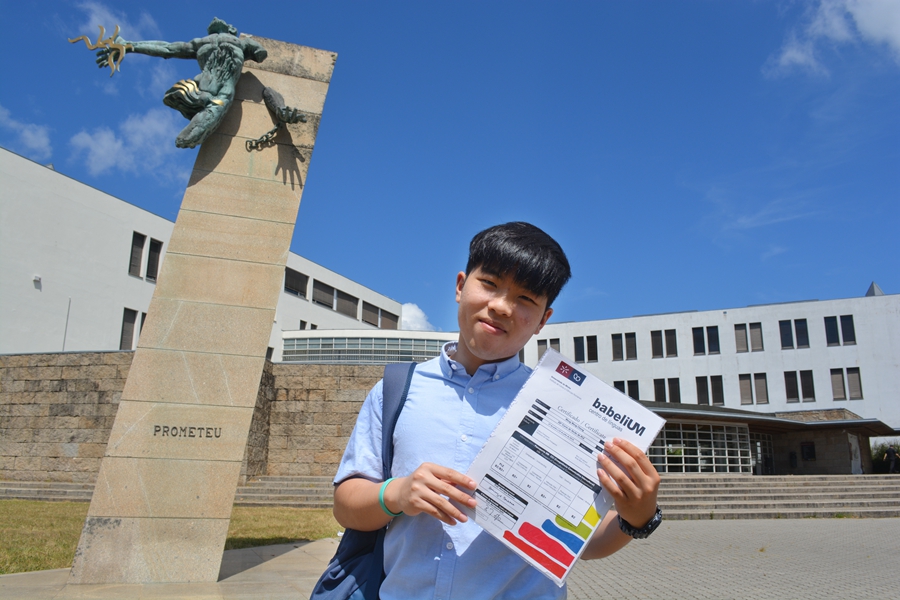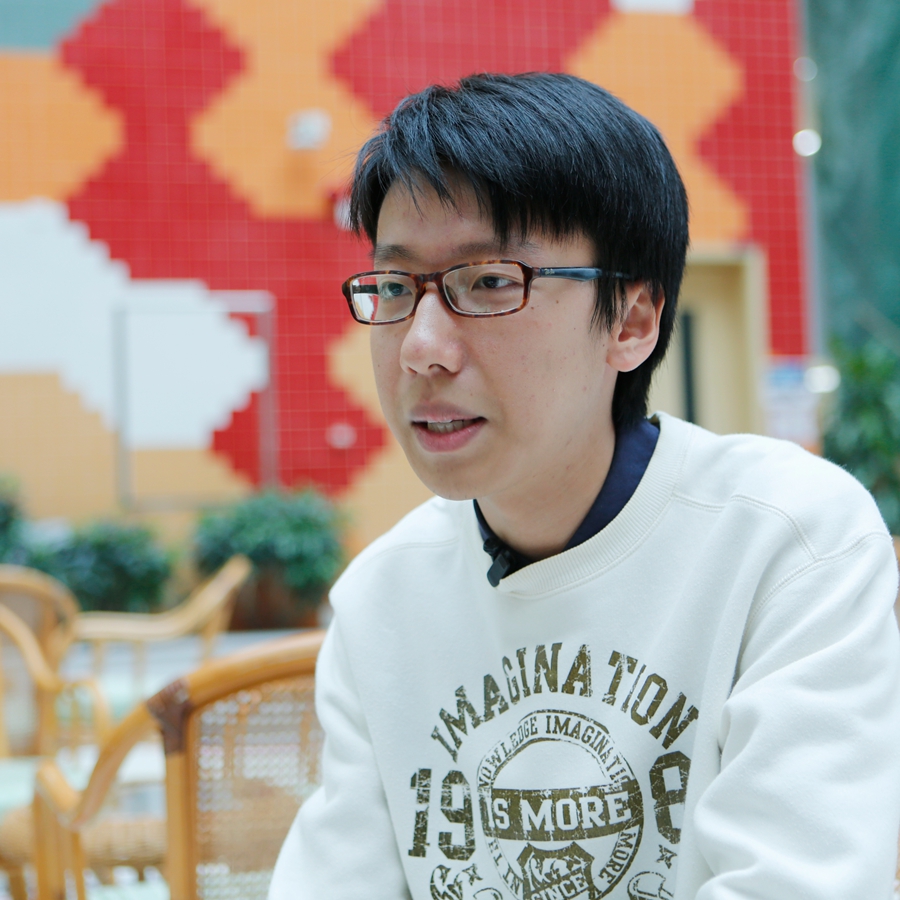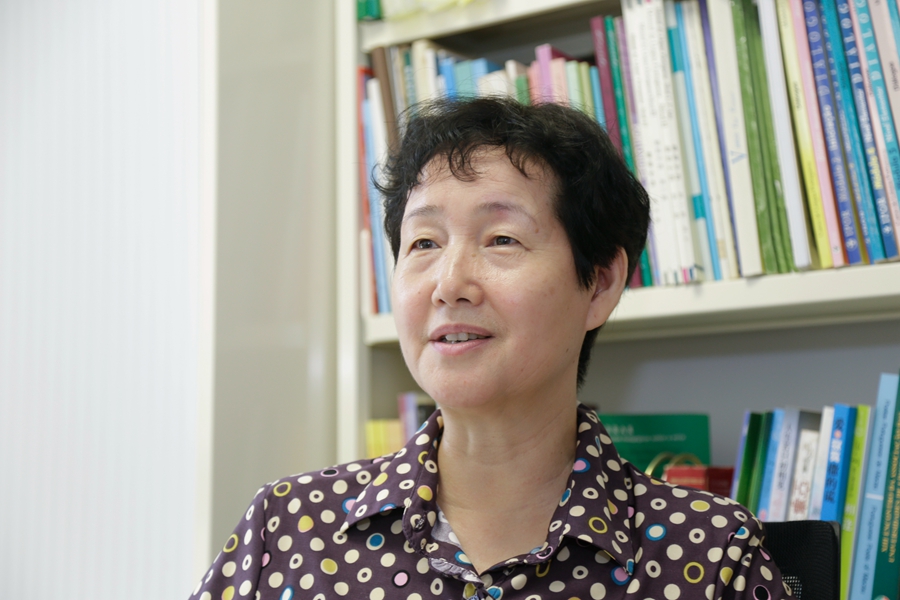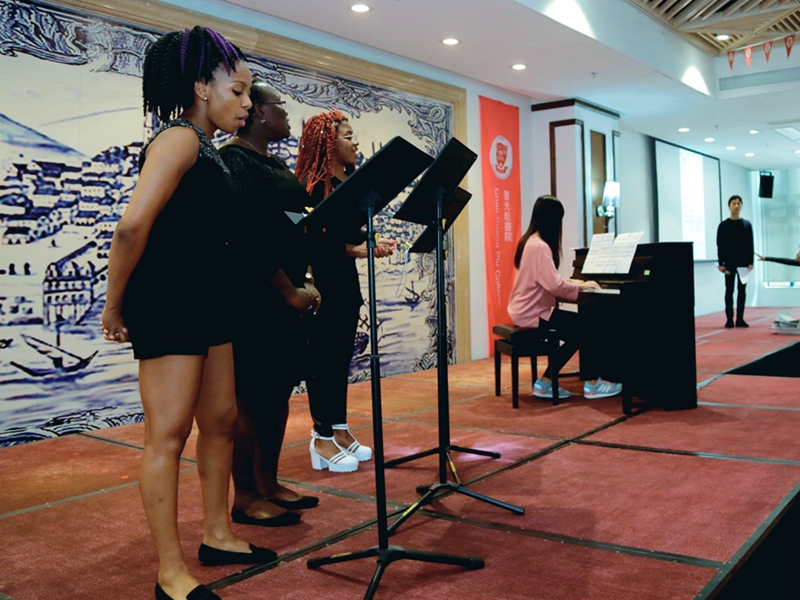Source: My UM
In recent years, more and more UM students are becoming interested in learning the Portuguese language. The zeal for learning the language is not just confined to students from the Department of Portuguese, students from many other faculties and departments are also taking advantage of the abundant learning resources to improve their Portuguese language skills, hoping that proficiency in the language will give them a competitive edge on the job market. In this issue’s cover story, we interview some non-Portuguese majors to learn more about their motivations and methods for learning the language.
Creating a Portuguese Learning Environment
Wong Weng Chong is a second-year student of the five-year bachelor of law programme (conducted in Chinese and Portuguese). He had no prior knowledge of the Portuguese language before joining UM. But after a year of study, he now not only can listen, speak, read, and write in Portuguese, he has also passed the Portuguese proficiency test (Level B2). ‘I want to be a lawyer or a judge,’ he says. ‘Many laws in Macao are written in Portuguese, so if I can learn Portuguese well in college, it will benefit my career development in the future.’
Students of the five-year bachelor of law programme have the opportunity to study Portuguese at a renowned university in Portugal in their freshman year. Wong says the good language learning environment and the goal-oriented study plan have been crucial to his fast progress within a short time. ‘I set a goal for myself—I wanted to pass the test at Level B2 within five months. With a clear goal, I felt more motivated,’ he says. For beginners like Wong, memorising new words, listening to radio stations, reading newspapers, checking dictionaries, and practising as often as possible are common ways to learn the language. ‘There are some rules and patterns about Portuguese pronunciation. At first I didn’t know them, so my progress was very slow. But after learning those rules and patterns, I progressed quickly. Within three months, I was already able to have simple conversations with Portuguese people,’ he says. Wong encourages those who are interested in learning Portuguese to create their own language learning environment on campus. ‘There are many Portuguese-speaking teachers at UM, you can practice your language skills by talking to them,’ he says. ‘For beginners, I recommend Gramática Ativa 1 and Passaporte para Português. I’ve gained a lot of new understanding of Portuguese grammar from these two books.’
Studying Portuguese as a Minor
Cheong Weng Lam, a third-year student from the Department of Psychology, started taking general education courses in Portuguese in her first year. In her sophomore year, she started studying the language as her minor subject, hoping to further improve her skills. She decided to learn Portuguese purely out of a genuine interest. ‘If I understand the language, I will be able to learn more about the cultures of Portuguese-speaking countries from Portuguese sources. And besides, the language skills will come in handy when I go on an exchange in a Portuguese-speaking country,’ she says. ‘Apart from Portuguese classes, I rarely have the opportunity to practise speaking Portuguese, but I usually write messages in Portuguese when communicating with those in my WeChat group who understand the language. We also make a point of speaking Portuguese, even just a little bit, when we meet. If your major is not Portuguese but you want to learn the language, then you must create opportunities for yourself to practise it.’
Cheong notes that recent years have seen a significant increase in the number of students interested in learning Portuguese, which she believes has much to do with the Macao SAR government’s plan to develop the city into a business service hub between China and Portuguese-speaking countries. ‘China has signed many business and trade agreements with Portuguese-speaking countries and African countries, which means that students who are proficient in Portuguese are likely to have an edge on the job market. I think that’s why more and more students are learning Portuguese.’
Using Real-life Scenarios to Aid Learning
There are many students from mainland China at UM who are also passionate about learning Portuguese. Yuan Kaihao, a fourth-year English major from the Faculty of Education, is one of them. He started taking general education courses in Portuguese in his freshman year, and continued until the end of the first semester of the third year. ‘I needed to go on an exchange overseas, so I stopped taking the course,’ he says. Yuan believes Portuguese is very useful and plans to resume learning it next year when he starts his master’s programme at UM. ‘Mainland students in the English department rarely choose Portuguese as their second foreign language, but I think mastering the language will give me a competitive edge when I return to the mainland after graduation,’ he says.
Yuan believes in using real-life scenarios to aid learning. ‘Portuguese verbs have different forms, and many words have a masculine or feminine gender. These make learning more difficult, but if you use real-life scenarios, it would be easier to understand. We have students from Portuguese-speaking countries in our residential college, and I would talk to them and ask them questions about the language. I’ve found that I learn faster this way,’ he says. Yuan thinks that it is a good idea to use Mandarin as the language of instruction for the general education courses in Portuguese, because it makes it easier for beginners to understand. ‘If those courses were taught by Portuguese-speaking teachers, it would make learning more difficult, because the students wouldn’t be able to understand the teacher.’
Portuguese—Key to Open the Doors to Portuguese-Speaking Countries
UM’s Department of Portuguese is the largest and strongest Portuguese-teaching department outside of Portugal and Brazil. It boasts a culturally diverse faculty team. Gao Lili, a senior instructor from the department, has been teaching at UM for 20 years now. She believes that Portuguese is like a key that has helped her open the doors to Portuguese-speaking countries. Her command of the language has allowed her to interview various political dignitaries in Portugal, including a former Portuguese president, as well as to travel to different parts of Portugal and Brazil in a more meaningful way. ‘I still remember the time when I studied Portuguese in Beijing. We had no internet, no dictionaries, and no foreign teachers. In a word, learning resources were scarce. We had a dictionary which we took turns reading,’ she recalls. ‘Today our students at UM have excellent learning resources. They have Portuguese-speaking teachers. They can listen to Portuguese radio stations and read Portuguese newspapers. Portuguese majors even have the opportunity to study in Brazil or Portugal in their third year.’
The general education courses in Portuguese offered at UM are mainly designed for non-Portuguese majors. In recent years, the number of students enrolled in these courses are increasing steadily. In the past, Gao usually had approximately 100 students per semester, but this semester more than 150 students enrolled for her courses. ‘The increasing classes and student numbers reflect a growing interest in the language,’ she says. ‘I once taught a non-Portuguese major. He kept on learning after graduation from UM. A few years ago he went for an interview with a Brazilian company, and his Portuguese language skills came in handy, as the whole interview was conducted in Portuguese. ’ Gao stresses the importance of interest in language learning. ‘If you want to learn Portuguese well, you must genuinely like the language, instead of just work for the grades,’ she says. ‘You can’t just learn it for one semester and then stop; you must treat it as a second foreign language that you keep learning.’ She notes that the Macao SAR government attaches great importance to training bilingual language professionals who can speak Chinese and Portuguese, and has set the goal to develop Macao into a Portuguese language training centre in the Asia Pacific region. ‘What this means is that students who are proficient in both English and Portuguese will definitely have a competitive edge on the job market,’ she says.

